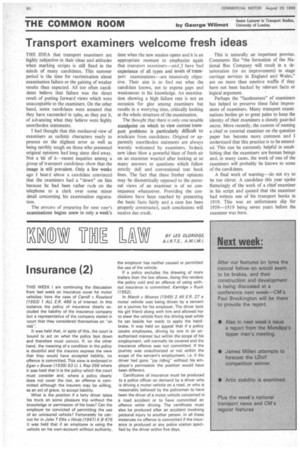MOM
Page 62

If you've noticed an error in this article please click here to report it so we can fix it.
Insurance (2)
THIS WEEK l am continuing the discussion from last week on insurance cover for motor vehicles: here the case of Carnill v Rowland (1953) 1 ALL E.R. 486 is of interest. In this instance the policy of insurance clearly excluded the liability of the insurance company but a .representative of the company stated in court that they considered themselves on "on risk".
It was held that, in spite of this, the court is bound to act on what the policy lays down and therefore must convict. If, on the other hand, the meaning of a condition in the policy is doubtful and the insurers express the view that they would have accepted liability, no offence is committed. This view is endorsed in Egan v Bower (1939) 63 LL L Rep 266 where it was held that it is the policy which the court must consider and, where. a policy clearly does not cover the risk, an offence is committed although the insurers may be willing, as an act of grace, to accept liability.
What is the position if a lorry driver takes his truck on some pleasure trip without the knowledge or permission of his boss? Can the employer be convicted of permitting the use of an uninsured vehicle? Fortunately he cannot for in John T Ellis v Hinds (1947)K B 475 it was held that if an employee is using the vehicle on his own-account without authority,
the employer has neither caused or permitted the use of the vehicle.
If a policy excludes the drawing of more trailers than the law allows, doing this renders the policy void and an offence of using without insurance is committed. Karridge v Rush (1952).
In Marsh v Moores (1949) 2 All E.R. 27 a motor vehicle was being driven by a servant on a journey for his employer. The driver took his girl friend along with him and allowed her to steer the vehicle from the driving seat while he sat beside her ready to apply the handbrake. It was held on appeal that if a policy covers employees, driving by one in an unauthorized manner but within the scope of his employment, will normally be covered and the insurance offence was not committed. If the journey was unauthorized or not within the scope of the servant's employment, i.e. if the driver had gone "joy riding" without his employer's permission the position would have been different.
Certificates of insurance must be produced to a police officer on demand by a driver who is driving a motor vehicle on a road, or who is reasonably believed by the policeman to have been the driver of a motor vehicle concerned in a road accident or to have committed an offence while driving. The certificate must also he produced after an accident involving personal injury to another person. In all these instances no offence is committed if the insurance is produced at any police station spedtied by the driver within five days.




































































































